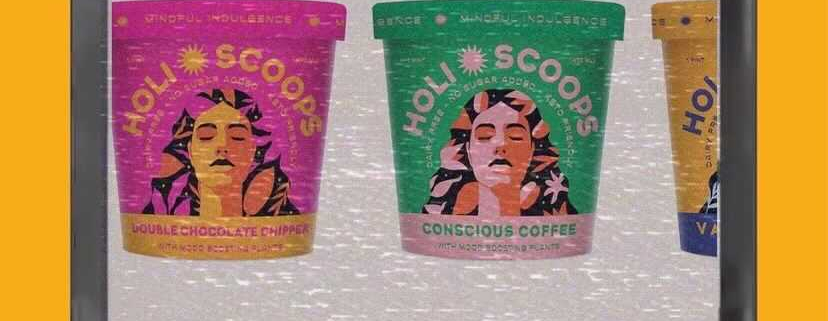Holi Scoops makes mouthwatering waves

Three years ago, Camille Lasker and Jenna Grossbart were making small batches of dairy-free ice cream out of a hotel kitchen that lent them their ice cream machine. Now their product, Holi Scoops, can be found on shelves across the nation in Sprouts, Erewhon and Farmshop, Calif.
Lasker, a Los Angeles-native and alumna from the Marshall School of Business, struggled with health issues her entire life. After living with digestion and autoimmunity issues and thyroid cancer, she soon altered her lifestyle, including her approach to food. A dessert fanatic, Lasker found it challenging to find alternative options that still satisfied her sweet tooth.
“[The dessert space] was really tough for me,” Lasker said. “I’ve always tried to look for healthy alternatives that feel good, so I decided to try to create something better.”
Once Lasker connected with Grossbart, a holistic nutritionist and food/brand consultant, they set out to create a dairy-free, keto-friendly ice cream with no sugar added. Their biggest goal? “To not sacrifice the indulgence piece,” Lasker said.
It was from this dream that Holi Scoops was born. Holi Scoops, short for Holistic Scoops, is a frozen plant-based, dairy-free and keto-friendly dessert company. It contains no added sugar with four grams of sugar coming only from date syrup. The pints are additionally adaptogenic, infused with mood-boosting plants.
Early on, Lasker knew she wanted to start a company, going on to UCLA to earn an MBA after graduating from USC. She worked on a mobile app startup and, from there, went between startups to gain experience.
Despite Grossbart’s nutritionist expertise and Lasker’s business background, the process for finding the right ice cream formula took two to three years. The most difficult part was the formulation of the product, Lasker said.
“When you take out traditional ingredients like dairy and sugar out of ice cream, you’re left with a scientific mess,” Lasker said.
After years of tweaking the recipe, switching up measurements and flavors to get the right consistency and taste while hitting their nutritional goals, the duo then experienced other obstacles, including packaging and manufacturing.
The biggest challenge with a capital-based startup is having the means to afford capital, particularly something that needs a well-packaged product. The two received several grants from UCLA to get the packaging done and to launch their final product.
“This product is really capital-intensive, so trying to get this product off the ground was really challenging,” Grossbart said.
With their product now on shelves nationwide, branding has been essential to their success. The duo reached out to agencies across the world and “loved” an art agency out of Mexico. They helped create Holi Scoop’s signature artwork and packaging, defined by the imagery of a woman depicted in fun colors, patterns and fonts.
“We kind of want her to communicate a sense of bliss and euphoria, just as if she’s just tried something delicious, but is at peace and calm,” Lasker said.
The tedious days of making small batches in a local hotel are long gone. Holi Scoops now works with one of the largest manufacturers in the United States. They produce up to 50,000 pints per batch to provide products to stores across the country.
“We’re really also trying to tell a story about the connection between mind and body … just to be able to tell a positive mental health story simultaneously,” Grossbart said.
Although the team is currently small, mainly consisting of Lasker and Grossbart, a group of interns also helps make Holi Scoops successful.
Charlie Siegel, a sophomore majoring in public relations, currently interns for Holi Scoops. After seeing the pints in Erewhon, he researched the company and saw their job listing looking for an intern. Just recently, Siegel helped with a promotional photoshoot for their Instagram.
“During this internship, I have had an opportunity to do a lot of real public relations work, from artwork to photoshoots to social media management,” Siegel said.
The company expects to go from stocking product at 100 stores to 400 by June. Lasker and Grossbart said they hope to make new flavors, create fun mini-sizes, explore novelties like popsicles and reach a wider audience through stores such as Target and Costco.
“I’m happy that I didn’t know how hard it would be when I started,” Lasker said. “I might not have taken the leap but I’m so happy I did … Why not fail and try and have experienced it rather than regret not trying at all?”

